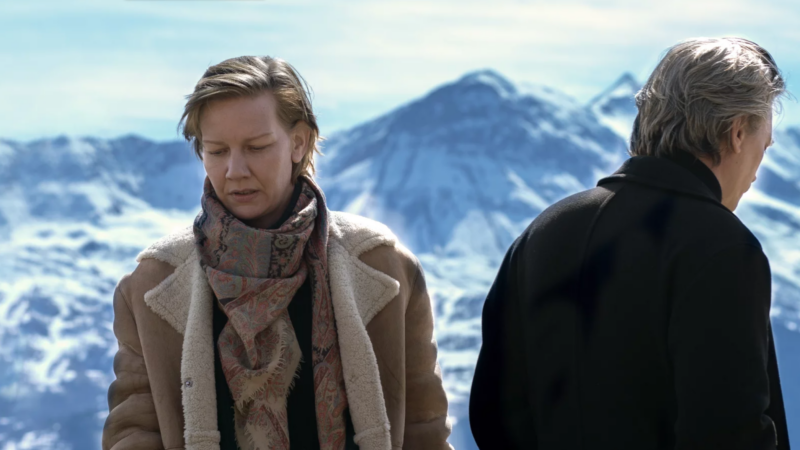In French Thriller Anatomy of a Fall, the Law Is No One's Friend
A tricky, excellent legal drama shows just how hard it can be to pin down the truth.

"The law is not your friend," a woman tells a young boy in Anatomy of a Fall, the excellent, tricky new thriller from French director Justine Triet. For if the law is your friend, then it is not someone else's friend. The law cannot take sides.
If the law is not your friend, in this conception, then neither is the movie. Although it is structured much like a conventional courtroom thriller, with a mysterious death, an investigation, a suspect, and, eventually, an extended trial, this movie—part legal drama, part murder mystery—is anything but conventional.
Rather, the movie, which won the top award at this year's Cannes Film Festival, is an exacting examination of the ways that truth, especially the sort of secondhand truth one finds in murder trials or stories about another person's marriage, can be impossible to pin down. Indeed, in its final moments, the movie suggests that even those who have experienced events directly themselves may not ever really be able to know what happened.
The film opens with a question: "What do you want to know?" A young grad student is visiting a half-finished French chalet, where she's interviewing Sandra (Sandra Hüller), a writer known for books that are part fiction, part autobiography. Sandra pushes back on the interview, suggesting that she gets to ask half the questions, even though she's the subject. From the beginning, the movie insists on counter-narrative, on giving weight to opposing points of view.
As the interview haltingly proceeds, loud music intrudes. It's her husband, Samuel, who is heard but not seen, repeatedly playing a steel drum cover of rapper 50 Cent's "P.I.M.P." in the background. Is he just playing loud music to keep himself company while he works in the attic? Or is he trying to disrupt the interview from afar? Meanwhile, Sandra and Samuel's son, Daniel, who is mostly blind, takes the family dog on a walk. The interviewer leaves as the music becomes too distracting; when Daniel returns, we see Samuel for the first time—lying dead on the snow outside their home.
The police eventually focus on Sandra, who claims to have been working and sleeping nearby as her husband died, as the prime suspect. What follows is an exceptionally tricky balancing act: Evidence is uncovered that suggests Sandra might have had reasons to murder her husband: regrets, insecurities, affairs, jealousy over professional success, and an angry, ranging argument caught on tape the day before Samuel's death. But with every revelation, Sandra's defense lawyer Vincent (Swann Arlaud) argues, with equal plausibility, that their marriage merely had ups and downs like any marriage. The movie is as much an investigation of a complex marriage as it is a possible murder. Could this unassuming, middle-class woman really have killed her partner, the father of her child?
There is a telling moment in the middle of the trial when the prosecution brings up a blood spatter expert to testify that Samuel's death must have come from an intentional blow to the head, delivered by another human, before his fall. The expert is clearly convinced of his interpretation and has video simulations to help prove it. It seems definitive, and it clearly tilts the case against Sandra. She must have done it.
A moment later, however, another blood spatter expert argues that it is all but impossible for the spatter to have been caused by a blow from a human. Samuel fell onto a shed, the second expert says, then bounced into the air, his body spinning, releasing blood in exactly the pattern discovered. It would have been nearly impossible for a human to have delivered the precise blow to make the spatter found. The second expert has test-dummy evidence and mock-up drawings to prove it. Sandra couldn't have done it.
So what does the blood spatter really tell us? What does any evidence actually reveal about the world?
The point is that even hard physical evidence is often subject to interpretation and secondhand reevaluation, and that two utterly opposing views, even from credentialed subject matter experts, can seem just as convincing. Although the movie, to its credit, doesn't wade into the broader cultural implications of this notion, it's not too hard to see it as a comment on the raging debates about trust, truth, and information ecosystems in Western media and politics.
As the trial hurtles toward its end, the movie doesn't just force viewers to weigh slippery, competing truths, it shows how difficult it can be to achieve certainty even when dealing with one's own firsthand experiences. After all, what are memories but personal records, inaccessible to anyone else, and subject to reevaluation and reinterpretation like any other piece of evidence? Truth is illusory, experts say. But one thing we can be sure of is that Anatomy of a Fall is a very, very good movie.


Show Comments (14)